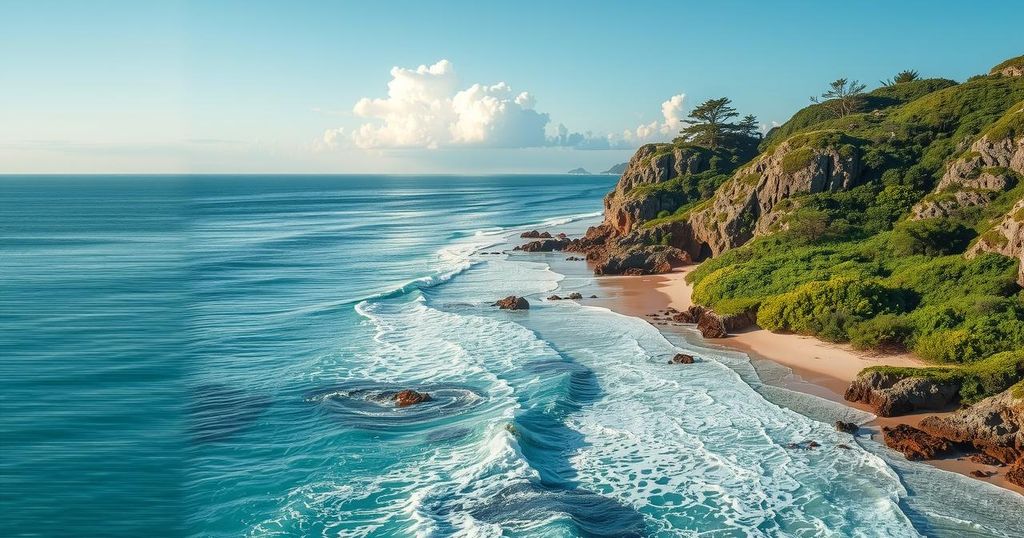Cabo Verde Urgently Needs Climate Adaptation to Prevent Economic Decline

The World Bank has alerted Cabo Verde that urgent climate adaptation steps are necessary to prevent a projected GDP contraction of 3.6% by 2050. With rising poverty levels and significant risks to tourism, the government needs to diversify its economic activities and invest in climate-resilient strategies. Support from Portugal and the IMF emphasizes the importance of global partnerships in tackling climate challenges.
The World Bank has issued a critical warning stating that Cabo Verde must urgently adapt to climate change, or face a contraction of its gross domestic product (GDP) by 3.6% over the next 25 years. Indira Campos, the World Bank representative in the nation, presented this information during the unveiling of the Country Climate and Development Report (CCDR) in Praia.
Negative impacts of climate change may also exacerbate poverty rates, with estimates suggesting an increase of 6.4%. Approximately one in five individuals in Cabo Verde will experience adverse effects, primarily from the tourism sector, which is anticipated to see a 10% reduction in revenue, jeopardizing the economy based on tourism.
The CCDR recommends shifting from a traditional “sun-and-sea” tourism model to more sustainable alternatives such as ecotourism and cultural tourism, which would be less vulnerable to climate threats. The report highlights various environmental challenges, including extended droughts, extreme rainfall, rising sea levels, and coastal erosion that put the islands’ natural assets and tourism at risk.
Amid rising challenges, Campos emphasized Cabo Verde’s potential to leverage obstacles into opportunities, pointing to the nation’s leadership and ambitious energy transition goals. The report outlines a strategic plan to invest in renewable energy and climate-resilient practices, identifying a need for $140 million annually—approximately 6% of GDP—to tackle these climate challenges over the next decade.
Gilberto Silva, Cabo Verde’s Minister of Agriculture, indicated that the government is preparing a climate law aimed at enhancing the regulatory framework for climate adaptation. Silva underscored the necessity for additional resources to support investments, citing initiatives like debt-for-climate swaps with Portugal as potential funding avenues.
The World Bank’s CCDR initiative aims to engage a spectrum of stakeholders including governments and civil society in discussions regarding climate action. These reports help prioritize impactful initiatives that attract funding. Recently, Portugal pledged €12 million to support investments in renewable energy projects in Cabo Verde, marking its commitment to addressing climate issues alongside the International Monetary Fund’s funding of $31.7 million under its Resilience and Sustainability Facility.
Prime Minister Ulisses Correia e Silva advocated for the establishment of innovative funding mechanisms tailored for small island nations dealing with climate change. He welcomed the United Nations’ creation of a Multidimensional Vulnerability Index, which could facilitate custom funding eligibility for countries like Cabo Verde that face unique challenges as Small Island Developing States.
Cabo Verde faces significant challenges due to climate change, which threatens to undermine its economic stability and growth. The country’s reliance on tourism makes it particularly vulnerable, as environmental degradation and hazards such as droughts and rising sea levels will impact income from this sector. The World Bank’s CCDR emphasizes the necessity for adaptation measures and policy changes to mitigate these risks and encourages investment in diverse tourism models, renewable energy, and sustainable agricultural practices.
In conclusion, the World Bank’s warning underscores the urgent need for climate adaptation in Cabo Verde to prevent significant economic contraction. The proposed shift in tourism strategy and investment in sustainable practices highlights the potential for the archipelago to address these challenges proactively. By securing innovative funding and adhering to climate resilience frameworks, Cabo Verde can enhance its GDP while mitigating poverty and environmental impacts.
Original Source: clubofmozambique.com






